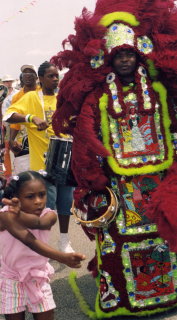
One of the major reasons Darlene and I like to catch the Zulu parade in Central City is that we almost always manage to find some Indians afterwards. I've written extensively on the Indians before (see my two archived columns from Mardi Gras 2005) but as a quick thumbnail sketch for those not familiar with the tradition, Mardi Gras Indian tribes (or gangs, as their members call them) are groups of (usually) working class African-American men who spend all year sewing elaborate costumes to parade in on Carnival Day (they also make appearances on St. Joseph's Eve and 'Super Sunday,' the first Sunday after St. Joseph's day). Their processions are marked by elaborate rituals, coded gestures, challenges between tribes over who is 'prettiest,' and chanted, call-and-response songs which sometimes date back for over a century, yet are constantly referrenced in local contemporary jazz, funk, and hip-hop music.
Since the Indians regard themselves as an outlaw, warrior culture, their processions are not scheduled, and they do not purchase police permits. Subsequently, there is a certain surrepititous nature to these events (the Spyboy, who is generally a block or two ahead of the procession, can spot police and, through a series of whistles and hand-gestures, make the whole event disappear) although sometimes the Big Chief will get in an 'in-your-face' mood and take his tribe right out into traffic, or, on at least one occasion that I have witnessed, across the Rex parade route, bringing it to a halt. But usually these things happen on the down-low.
Uptown tribes have traditionally gathered in the area of Shakespeare Park (officially known as A.L. Davis playground) at the corner of Washington and LaSalle near the old Dew Drop Inn. Even though the park is now filled with FEMA trailers, we had good luck there last year. The really great thing about spotting these processions at or near their origins is that they have yet to attract huge crowds, so you can really get right up in there and participate. The Indians are all about beauty and respect. Neighborhood folks will often join in on the chorus of the songs they sing.
"I'm a little bitty boy and I do not fight.
Shoo fly, don't bother me
My axe don't get 'cha my pistol might.
Shoo fly, don't bother me."
There is a truly magical aspect to these things. The costumes seem to create a persona much larger than the people inside them, who are of course just ordinary men. In their 'suits,' they take on an aura of mythical beasts, or the Lwa spirits which inhabit the voodoo pantheon. These things, and so many others in New Orleans culture, have a sense of being part of a much larger whole, where the Indians, their songs, the voodooists and their rituals, the food, music, musicians, dancers, unique languages and cultures all work together to create an overarching vibe that really is like no place I've ever been before. |


Comments on "Told My Mama I Told My Wife, I'm Gon' Mask That Morning It Cost My Life."
post a comment